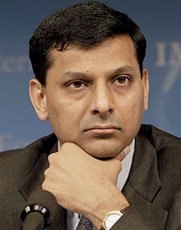Low rates no substitute for productivity losses: Rajan
20 May 2015
 Low interest rates or cheap money cannot be a substitute for falling productivity growth and the plateauing of education levels and labour participation rates as well as a shrinking labour force in some countries where an ageing population hold back growth, Reserve Bank of India governor Raghuram Rajan has said.
Low interest rates or cheap money cannot be a substitute for falling productivity growth and the plateauing of education levels and labour participation rates as well as a shrinking labour force in some countries where an ageing population hold back growth, Reserve Bank of India governor Raghuram Rajan has said.
In many developed countries growth has been held back by the headwinds of shrinking labour productivity and the plateuing of education levels.
Productivity had fallen further (with a temporary positive uptick towards the end of the 1990s because of the IT revolution), he said.
Speaking on the theme 'Going Bust for Growth' at the Economic Club of New York, Rajan raised concern over central banks globally being pushed into "competitive monetary easing."
He said lower interest rates and tax incentives can boost investments, but it is consumer demand that holds the key for pushing economic growth.
He also advocated stronger and well-capitalised multilateral institutions, as also better international safety nets.
"The current non-system in international monetary policy is, in my view, a source of substantial risk, both to sustainable growth as well as to the financial sector.
Rajan said not only has productivity growth fallen further, but growth has been held back by the headwinds of plateauing education levels and labour participation rates, as well as a shrinking labour force in some countries because of population ageing.
''It is obvious from these lists of factors that it is hard to disentangle the effects of weak aggregate demand from slow growth in potential supply. Population ageing contributes to both. Indeed, one may cause the other.
''For example, anticipating a slowdown in growth potential, households, worried about impending retirement in the face of undeliverable pension and healthcare entitlements, may try and build savings. This will depress demand further. Conversely, anticipated weak demand may reduce incentives for corporations to invest in physical and human capital, causing supply potential to grow more slowly,'' he pointed out.
Structural reforms, typically ones that increase competition, foster innovation, and drive institutional change, are the way to raise potential growth.
But these immediately hurt protected constituencies that have become accustomed to the rents they get from the status quo. Moreover, the gains to constituencies that are benefited are typically later and uncertain while the pain is immediate and its incidence clear.
No wonder Jean-Claude Juncker, then Luxembourg's prime minister, said at the height of the Euro crisis, ''We all know what to do, we just don't know how to get re-elected after we've done it!''
"It is not an industrial country problem, nor an emerging market problem, it is a problem of collective action. We are being pushed towards competitive monetary easing and musical crises," he said.
Speaking about the reasons for why it is so hard for the world to restore pre-Great Recession growth rates, Rajan said, "How does one offset weak household and government demand if debt write-downs are off the table?
"Ideally, the response would be to incentives investment and job creation through low interest rates and tax incentives. But if final demand from consumers is likely to be very weak for a considerable period of time because of debt overhang, the real return on new investment may collapse."
Noting that policy rates cannot be reduced significantly below zero, though a number of European countries are testing these limits, Rajan said equilibrium long term interest rates may stay higher than levels necessary to incentivise investments.


















